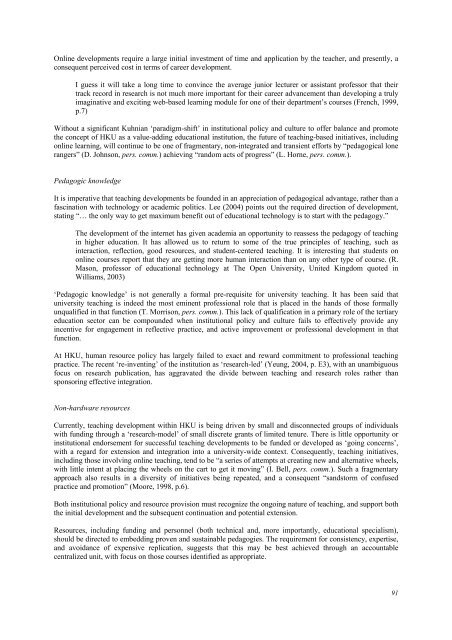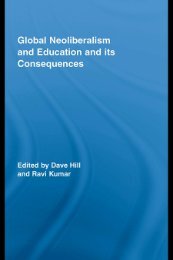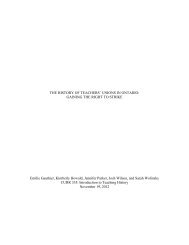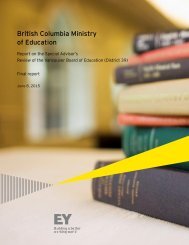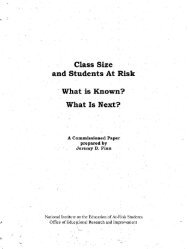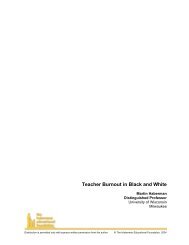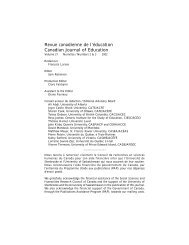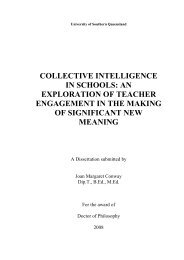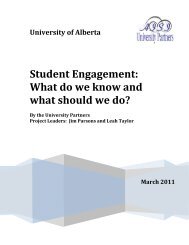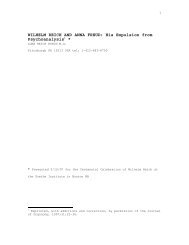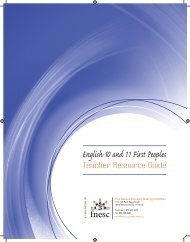October 2006 Volume 9 Number 4
October 2006 Volume 9 Number 4
October 2006 Volume 9 Number 4
Create successful ePaper yourself
Turn your PDF publications into a flip-book with our unique Google optimized e-Paper software.
Online developments require a large initial investment of time and application by the teacher, and presently, a<br />
consequent perceived cost in terms of career development.<br />
I guess it will take a long time to convince the average junior lecturer or assistant professor that their<br />
track record in research is not much more important for their career advancement than developing a truly<br />
imaginative and exciting web-based learning module for one of their department’s courses (French, 1999,<br />
p.7)<br />
Without a significant Kuhnian ‘paradigm-shift’ in institutional policy and culture to offer balance and promote<br />
the concept of HKU as a value-adding educational institution, the future of teaching-based initiatives, including<br />
online learning, will continue to be one of fragmentary, non-integrated and transient efforts by “pedagogical lone<br />
rangers” (D. Johnson, pers. comm.) achieving “random acts of progress” (L. Horne, pers. comm.).<br />
Pedagogic knowledge<br />
It is imperative that teaching developments be founded in an appreciation of pedagogical advantage, rather than a<br />
fascination with technology or academic politics. Lee (2004) points out the required direction of development,<br />
stating “… the only way to get maximum benefit out of educational technology is to start with the pedagogy.”<br />
The development of the internet has given academia an opportunity to reassess the pedagogy of teaching<br />
in higher education. It has allowed us to return to some of the true principles of teaching, such as<br />
interaction, reflection, good resources, and student-centered teaching. It is interesting that students on<br />
online courses report that they are getting more human interaction than on any other type of course. (R.<br />
Mason, professor of educational technology at The Open University, United Kingdom quoted in<br />
Williams, 2003)<br />
‘Pedagogic knowledge’ is not generally a formal pre-requisite for university teaching. It has been said that<br />
university teaching is indeed the most eminent professional role that is placed in the hands of those formally<br />
unqualified in that function (T. Morrison, pers. comm.). This lack of qualification in a primary role of the tertiary<br />
education sector can be compounded when institutional policy and culture fails to effectively provide any<br />
incentive for engagement in reflective practice, and active improvement or professional development in that<br />
function.<br />
At HKU, human resource policy has largely failed to exact and reward commitment to professional teaching<br />
practice. The recent ‘re-inventing’ of the institution as ‘research-led’ (Yeung, 2004, p. E3), with an unambiguous<br />
focus on research publication, has aggravated the divide between teaching and research roles rather than<br />
sponsoring effective integration.<br />
Non-hardware resources<br />
Currently, teaching development within HKU is being driven by small and disconnected groups of individuals<br />
with funding through a ‘research-model’ of small discrete grants of limited tenure. There is little opportunity or<br />
institutional endorsement for successful teaching developments to be funded or developed as ‘going concerns’,<br />
with a regard for extension and integration into a university-wide context. Consequently, teaching initiatives,<br />
including those involving online teaching, tend to be “a series of attempts at creating new and alternative wheels,<br />
with little intent at placing the wheels on the cart to get it moving” (I. Bell, pers. comm.). Such a fragmentary<br />
approach also results in a diversity of initiatives being repeated, and a consequent “sandstorm of confused<br />
practice and promotion” (Moore, 1998, p.6).<br />
Both institutional policy and resource provision must recognize the ongoing nature of teaching, and support both<br />
the initial development and the subsequent continuation and potential extension.<br />
Resources, including funding and personnel (both technical and, more importantly, educational specialism),<br />
should be directed to embedding proven and sustainable pedagogies. The requirement for consistency, expertise,<br />
and avoidance of expensive replication, suggests that this may be best achieved through an accountable<br />
centralized unit, with focus on those courses identified as appropriate.<br />
91


